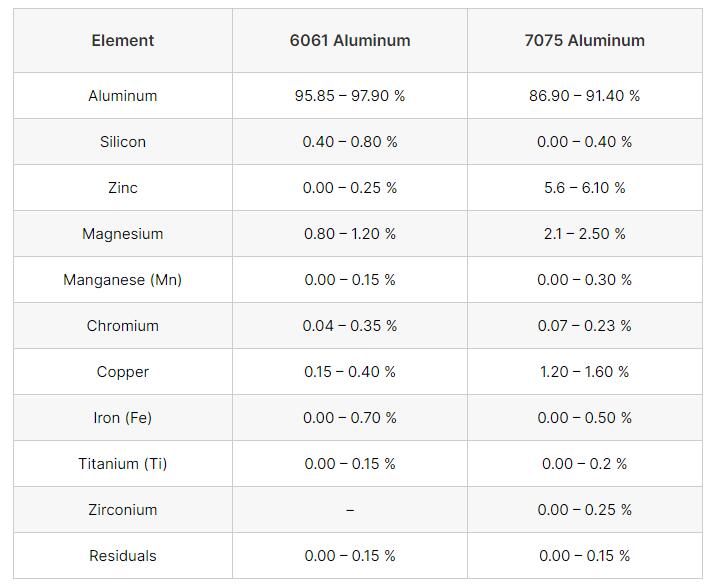Aluminum is still one of the most commonly used materials in all walks of life. The reason is simple, aluminum exhibits an impressive strength-to-weight ratio and has excellent relative workability.
The most popular aluminum alloys used in manufacturing are 6061 aluminum and 7075 aluminum. Although similar in some respects, there are some significant differences between 6061 and 7075 aluminum. It is very important to understand the difference between these two alloys. This allows the most suitable materials for the project to be selected efficiently. We will introduce the obvious differences between 6061 aluminum and 7075 aluminum from chemical composition, mechanical properties and application fields.
6061 VS 7075 Aluminum: Alloy Series and Chemical Composition
You can infer the first difference between 6061 and 7075 aluminum from the name. 6061 aluminum is a member of the 6000 grade or alloy series. This type uses silicon and magnesium as the main alloy components. On the other hand, 7075 aluminum alloy is a member of the 7000 series. Therefore, it uses zinc and copper as the main alloying elements. The following table contains a complete classification of 7075 aluminum and 6061 chemical composition.

6061 vs. 7075 Aluminum: Mechanical Properties
Let us continue to discuss the mechanical properties of the aluminum alloy in question. The following are the mechanical properties you need to consider when choosing between 6061 and 7075 aluminum alloys:
Yield Strength
Yield strength is essentially the ability of a material to withstand pressure and impact without deformation. 7075 aluminum alloy has a higher yield strength than 6061 aluminum. Due to the higher percentage of zinc, the yield strength of the former is higher. 7075 aluminum can withstand greater pressure and greater impact without deformation. However, the yield strength of 6061 is not bad, and its yield strength is 276 MPa.
Thermal Conductivity
Aluminum alloys are generally good conductors of heat. However, 7075 aluminum and 6061 aluminum have different thermal conductivity. This is also the result of their chemical composition and heat treatment. The thermal conductivity of 6061 aluminum is slightly higher than that of 7075 aluminum. Therefore, if heat dissipation is the main purpose, you will need to use 6061 aluminum.
Resistivity
Low resistivity means that the material has good electrical conductivity, and vice versa. Both 7075 and 6061 aluminum have low resistivity, which means they are good electrical conductors. Therefore, these alloys are suitable for electrical applications. However, the difference between 6061 and 7075 aluminum is that 6061 has the lowest resistivity. Therefore, it is a better conductor than 7075 aluminum.
Elasticity
Elasticity is a measure of the stiffness of a material. In other words, you need to check the elasticity of the material before use. Elasticity can also help you determine the material’s ability to resist deformation. 6061 and 7075 aluminum alloys have similar elasticity.
Temperature Resistance
Temperature resistance is a measure of the ability of a material to withstand heat without causing deformation. We compare the melting points to analyze the temperature resistance of 7075 t6 and 6061 t6. The melting point of 7075 aluminum is 477 – 635°C, while the melting point of 6061 aluminum is 582 – 652°C. Therefore, 6061 alloy can withstand higher temperatures than 7075 alloy. However, you should note that 7075 aluminum has an excellent response to heat treatment.
Material Hardness
The harder the material, the greater the chance of resisting indentation, penetration, and other deformation forces. Both of these alloys are hard enough to resist pressure and will not crack or deform. When choosing between 6061 and 7075 aluminum alloys, material hardness is an important factor. To be precise, 7075 aluminum alloy is harder than 6061 aluminum.
Corrosion Resistance
6061 aluminum alloy is more resistant to corrosion than 7075. The copper content of 7075 alloy is much higher than that of 6061. Copper usually reacts quickly with the environment and causes corrosion, so 7075 aluminum is more prone to corrosion.
6061 vs 7075 Aluminum: Applications
There is an application “overlap” between 6061 and 7075 alloys. Both of these alloys can be used in the manufacture of automotive parts, aerospace components and consumer products. However, they are different in specific areas of use.
6061 Application
6061 aluminum has good formability, performs well in extrusion projects, and is easy to connect by welding. Mainly used in the following areas:
- Automobile industry
- Modern aircraft industry
- Construction industry
- consumer goods
- Electrical accessories
- food industry
- Shipbuilding industry
7075 Application
7075 alloy is one of the strongest types of aluminum available, and it performs well in the high-stress environments found in the aerospace industry, high-wear parts, structural materials, and military applications. Mainly used in the following industries:
- Industrial tools and molding
- Aviation industry, such as airplanes
- Transportation Industry
- Rock climbing and inline skating equipment
- firearms
- Camping equipment
Summary: Which Alloy To Choose For 6061 And 7075?
Both 6061 and 7075 aluminum alloys have impressive mechanical properties. However, if your project requires high-strength and low-weight materials, you will need to use 7075. If the parts are subject to a lot of heat and friction, we recommend that you use 7075 aluminum alloy, because the strength of the material will be the key to the success of the project.
If the parts require extensive machining and welding, we strongly recommend 6061 aluminum alloy. Since 6061 is relatively cheap, if your budget is limited, you should choose it.


